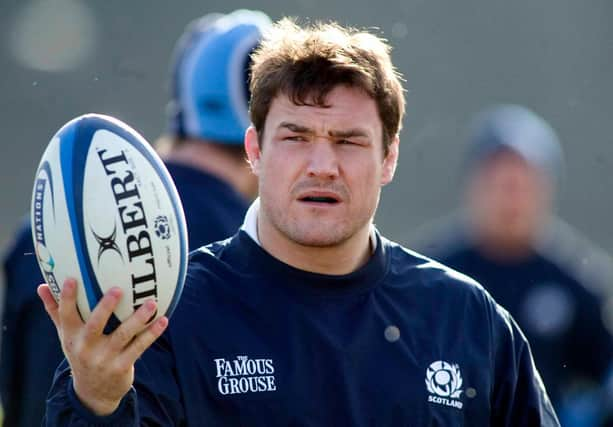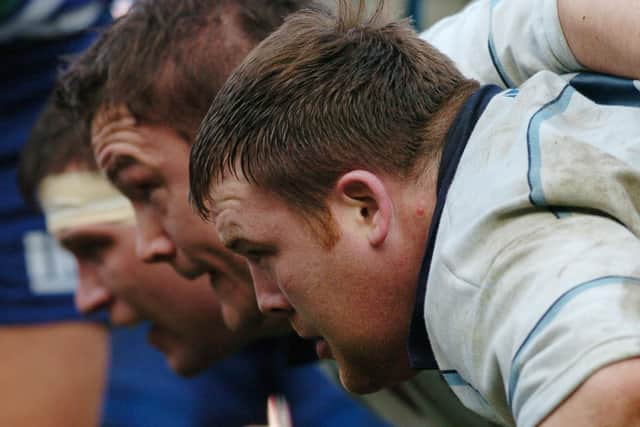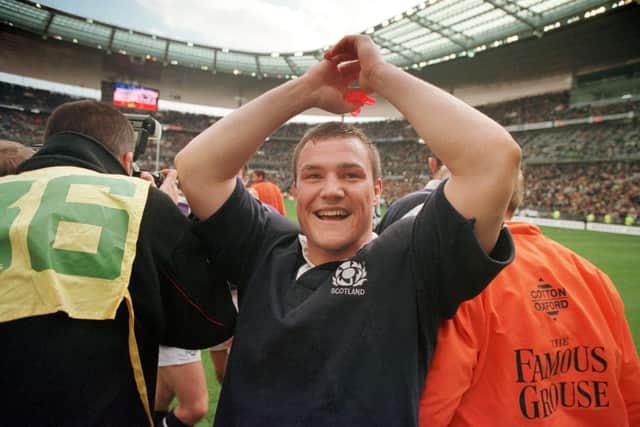Saturday Interview: Gordon Bulloch on how it was a "black mark" to be a rugby player from Glasgow and how he survived the "mediocre" years with Scotland


“I’m sending you photos,” says Gordon Bulloch with a harrumph and yes, when they arrive during our Zoom chat, it’s a straight and solid-seeming structure, sitting over the door as porches tend to do, the wood, er, contrasting with the stone of the building and … you can probably tell I’ve no idea what I’m talking about but I reckon Kevin McCloud of TV’s Grand Designs would be impressed.
This is typical of how ex-hooker Bulloch gets his kicks, post-rugby, since finishing with the international game as a British Lion in New Zealand in 2005. With younger brother Alan, who won five caps, he’s built Highland holiday homes and back at the foot of Camspie Fells, where he lives with his wife Jenni and daughter Ellie, his big lockdown project was knocking up a gym for himself.
Advertisement
Hide AdAdvertisement
Hide AdWhat a show-off, I’m thinking, but this is simply jealousy for my wife would love me to be this capable, this macho. Some previous work at his property, a supposedly professional job, he’d rated as abysmal. “So for the porch I decided: ‘How difficult can this be? I’m doing it.’”


This was his competitiveness showing, the thing he misses most about rugby when Bulloch was often a bullock, and which he now puts into hill-running. “If there’s a guy up ahead of me I have to shoot past him, even if he’s a 66-year-old retiree,” he laughs. Back to the porch: “An architect friend helped with the plans. At that point I had no experience of anything like this and I know my pal thought I was going to make a complete arse of it. But the porch hasn’t blown away yet and to make the shortlist for a small buildings competition was nice.”
Now, there might be a parallel here with Bulloch’s era in dark blue. A similar tale of new territory, holding one’s breath and taking the plunge. Unfortunately for Scotland there was no YouTube tutorial on going professional.
No doubt about it, he says, the team in the early seasons of the new century were “mediocre”. There were thumpings from England and France and even their ritual domination of today’s opponents Ireland was trashed.
Eleven victories and one draw. There had never been a sequence like it in this fixture, not even when Jackie Kyle’s great post-war Irish XV were winning a first-ever Grand Slam. Bulloch played in the last two Scottish successes – in 1999 when of course the championship was claimed and the following year. Then: enter Brian O’Driscoll.


“Brian scored three tries in the Stade de France [in 2000] and Irish rugby changed forever. They built a team round him – and Gordon D’Arcy and Ronan O’Gara – and that’s just continued. Leinster have been the best side in Europe for the last 20 years and before that Munster were the kings. In contrast I was playing for Glasgow when they had no home and no identity. Those were the days of the Welsh-Scottish League. Imagine having to get a bus down to Wales five weekends in a row. That actually happened. Ireland grasped the opportunity of the pro-game right away while we struggled with it for ten long years.”
There was another O’Driscoll hat-trick against the Scots in 2002 and, in four successive Irish wins until our man hung up the boots, we conceded 18 tries. “It was a tough time and not pleasant on the pitch or off it,” admits the Glaswegian, 47 next week, who also lost three times to Italy. “There were all these ex-players writing newspaper columns about how Scotland were so much better in their day. We tried hard with what we had but we weren’t blessed with the best players. I remember another time against the Italians when we were absolutely desperate for a win and just shut the game down. That would have been one of those days at Murrayfield when you would have heard a pin drop and it finished me off.”
How did rugby start for him? At school, Hutchesons’ Grammar, alma mater of John Buchan, R.D. Laing and Carol Smillie. There’s a front row to wow the crowds but Bulloch was following in his father’s footsteps, dad Jim having pushed for a cap as a prop with the Hutchie FPs only to find two formidable characters blocking the way in Ian McLaughlan and Sandy Carmichael.
Advertisement
Hide AdAdvertisement
Hide AdLater Jim became a referee and young Bulloch would be entrusted with the spare whistle on car rides to Langholm, Haddington and Howe of Fife where the abuse directed at the official would be variously hilarious or unrepeatable. He remembers a trip to Jedforest and being disappointed to learn that Roy Laidlaw wasn’t in the side. But his replacement turned out to be not bad – Gary Armstrong – and this pair would play team up later.
Bulloch took to rugby right away. “I loved playing with my mates, loved the physicality.” And it must have been handy having a brother at home – there’s two years between them – who he could beat up. Bulloch’s debut came against South Africa in 1997 with Alan following three years later. “I missed his first game through concussion – an English hooker who shall remain nameless caught me with a cheap shot – but we managed to play together in the others, which was great, though funnily enough I don’t think there’s a photo of us on the pitch, arms around each other. Probably more would be made of brothers playing for Scotland now but these were more innocent times.
“Alan would probably have done better in this era of rugby where the best players are brought together and improved. In our day early on you could put the ball under your arm, beat four or five men, score a try and do that three times in a game – but your skills wouldn't really be developed for later in your career. Maybe, though, I got away with playing when I did when I wasn’t the biggest. I’m sure the hookers who’ve come after me have all been over 6ft.”
Still, there was a hurdle Bulloch did have to overcome: his Glaswegianness. He laughs, remembering the jibes and joshing players from his home city would have to endure from the acknowledged rugby heartlands. “GHK [Glasgow High Kelvinside] never won the league. They might have been there or thereabouts at Christmas-time but the joke always was that when the going gets tough, Glasgow goes skiing. My old West of Scotland team-mate, Dave Barrett, had great fun playing up to the gags about us: he’d arrive at Hawick and Gala wearing this big, flouncy cravat. Dave was a terrific passer, lovely deft touch, and with a different attitude he could have played for Scotland. And I knew, as far as [coach] Jim Telfer was concerned, being from Glasgow would have been a black mark against my name: not to be trusted! I had to earn his respect, which was absolutely fair enough. I had to lay my body on the line for him and sometimes training would only stop when he’d seen blood spilled.”
After two defeats, Bulloch’s first win in a Scotland shirt came against Ireland – 17-16 at Lansdowne Road in 1998. “What I remember about that day is us being stuffed virtually all game long because of Paul Wallace’s illegal scrummaging technique. But for the last ten minutes we brought on David Hilton who sorted him out and we sneaked it.”
Something similar today – with the current Scotland side likely to find themselves under just as much pressure – would prompt feelings of what might have been for Scotland in 2022. What has Bulloch, an old team-mate of head coach Gregor Townsend, made of this campaign? “I actually think they’ve played some good rugby but perhaps the belief hasn’t always been there at crucial moments. Plus a team will always need a little bit of luck. In the Wales game, if they’d had it, then two wins from two would have brought us momentum.
“Other countries with more players than us, and more of the cream rising to the top, should have an advantage and usually do. Games are so tight now and our top guys, Stuart Hogg and Finn Russell, have each probably turned in ten better performances in their Scotland careers than they managed anywhere this year. For us to succeed in this age is more difficult than it was in 1984, 1990 and 1999 (the two Grand Slams and the last-ever Five Nations triumph]. There’s been so much pressure on Hoggy and Finn in this championship to create the little pieces of magic we’ve seen from them many times before. Ali Price had a great game last weekend but that was against Italy. Successful teams nowadays probably need more than two game-breakers, maybe four or five guys who can produce the surprise moments that can turn three-point deficits into two-point wins.”
Against Ireland in ’98 and for most years after Bulloch would eyeball Keith Wood – “a colossus, I wanted to emulate him.” Three years later, called up as cover for the Lions tour of Australia, he found himself sat next to the first World Rugby Player of the Year on a bus discussing the fine art of the lineout – “a pinch-myself moment.”
Advertisement
Hide AdAdvertisement
Hide AdGrabbing onto his hind-quarters the first time in Dublin were Damian Cronin and Doddie Weir. “Two characters, for sure. Everyone knew what a crafty character Damian was, always looking for short cuts, and you wouldn’t regard him as a fabulous physical specimen, more of a big lump of a guy, but a great competitor all the same. Doddie was that fabulous physical specimen, a wonderful player who loved to laugh and joke but was deadly serious at the critical moments. When you got a lineout right he’d give you a wee nod. I treasured those, just as I did the ones from Tom Smith, a man of few words next to me in the front row, but my goodness, what a player he was.”
And it wasn’t all mediocre. Nothing could dent Bulloch’s “vast pride” in captaining his country and the victory over Wales in 2002 when he grabbed two tries still stands as our last Cardiff success. Also, he will always have ’99, and the fact the current team were tipped for a chance of emulating that achievement but haven’t come close only adds more lustre to it.
“I don’t think we were fancied that year so there wasn’t any pressure on us but we were quietly confident of doing well. It wasn’t like today where there’s minutely-detailed analysis of every piece of play which is pored over for weeks on end. Some guys could come into that championship as relative unknowns. Glenn Metcalfe was like that, and John Leslie too – and how was Alan Tait going to fare coming back from rugby league? Pretty brilliantly, as it turned out, the lineout worked exceptionally well and the forwards were great at churning back ball for our runners and we ended up scoring 16 tries.”
After retiring from the pro game Bulloch returned from whence he’d came, to West of Scotland, for the time-honoured welcome accorded to big names dropping back down in the autumn of their careers. “I had a target on my back for three years! The young pups wanted to get one over on me and so did the old-timers. But although that was good fun, everyone was desperate to win, which was why I got involved in rugby in the first place. And even in exhibition games in Bermuda where of course there were laughs and plenty of drinking I hated losing and was always grumpy when I did.”
There speaks a true competitor, as the hill-runners of Killearn – and the porch-builders, too – would surely testify.
Comments
Want to join the conversation? Please or to comment on this article.